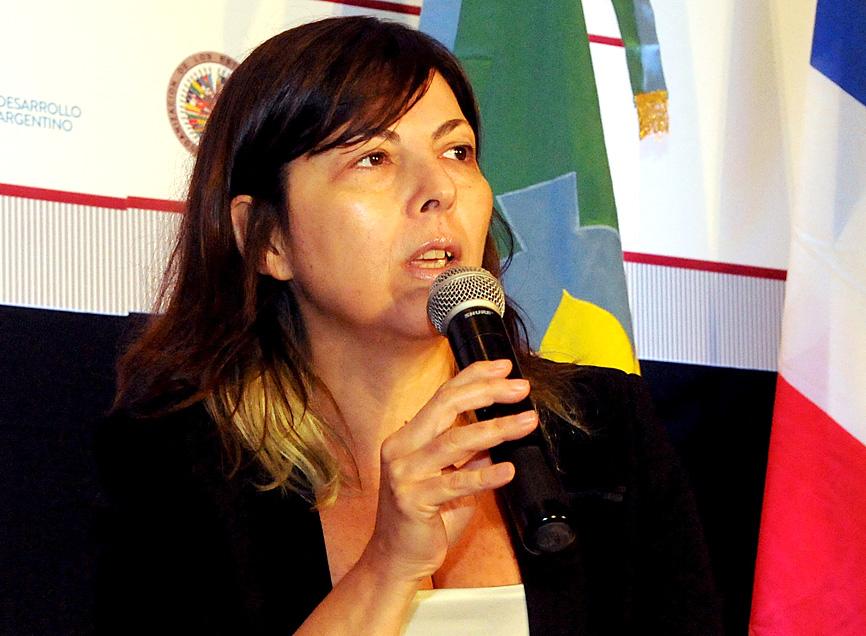Argentine President Alberto Fernandez on Sunday tapped leftist economist Silvina Batakis as the country’s new economy minister after her predecessor’s resignation on Saturday deepened a political crisis boiling over into the economy and markets.
Fernandez spokeswoman Gabriela Cerruti confirmed the decision to Bloomberg News.
Batakis, a low-profile policymaker whose appointment came as a surprise, did not respond to a request for comment from Bloomberg News on late on Sunday night.

Photo: Reuters
Batakis inherits a long list of economic challenges and the government’s US$44 billion program with the IMF.
The announcement capped more than a day of suspense and uncertainty sparked by former Argentine minister of economy Martin Guzman’s resignation following two-and-a-half years in the job.
It remained unclear on Sunday night if Fernandez would make other Cabinet changes. Central bank President Miguel Pesce confirmed to Bloomberg News that he would stay in his role.
The second woman to serve as the nation’s top economic official, Batakis was the economy minister of Buenos Aires Province from 2011 to 2015 under then-governor Daniel Scioli, a far-left coalition leader who recently became production minister.
More recently, she served in a second-tier role in the Argentine Ministry of the Interior.
The appointment was made after Fernandez met for hours on Sunday with Argentine Chamber of Deputies President Sergio Massa.
‘BALANCE OF POWER’
Argentine Vice President Cristina Fernandez de Kirchner, who is publicly critical of the president and his economic team, spoke to him on Sunday evening by telephone, local media reported.
“Batakis’ appointment seems to signal that the balance of power has tilted to the Kirchnerist side,” Diego Pereira, an economist at JPMorgan Chase & Co, wrote in a note to clients on Sunday. “We would expect a more expansive fiscal stance, and potentially a renegotiation of the IMF program.”
Markets would be watching for clues on Batakis’ economic agenda, the IMF program and how she plans to navigate a divided ruling coalition that ended Guzman’s tenure.
Analysts pointed to her lack of experience formulating major economic policies or negotiating with the IMF. Batakis could also represent a turn toward far-left economic policies, given her track record.
“It’s a victory for Cristina,” said Camila Perochena, a political analyst and professor at Torcuato di Tella University in Buenos Aires. “For financial markets, it’s an awful impact.”
Crisis-prone Argentina is battling inflation at more than 60 percent, with nearly 40 percent of the population living in poverty and the economy forecast to enter a recession this year.
The central bank has razor-thin cash reserves that it is struggling to build up amid low credibility and high prices on energy imports and the country’s bonds trade in distressed territory.

The DBS Foundation yesterday announced the launch of two flagship programs, “Silver Motion” and “Happier Caregiver, Healthier Seniors,” in partnership with CCILU Ltd, Hondao Senior Citizens’ Welfare Foundation and the Garden of Hope Foundation to help Taiwan face the challenges of a rapidly aging population. The foundation said it would invest S$4.91 million (US$3.8 million) over three years to foster inclusion and resilience in an aging society. “Aging may bring challenges, but it also brings opportunities. With many Asian markets rapidly becoming super-aged, the DBS Foundation is working with a regional ecosystem of like-minded partners across the private, public and people sectors

BREAKTHROUGH TECH: Powertech expects its fan-out PLP system to become mainstream, saying it can offer three-times greater production throughput Chip packaging service provider Powertech Technology Inc (力成科技) plans to more than double its capital expenditures next year to more than NT$40 billion (US$1.31 billion) as demand for its new panel-level packaging (PLP) technology, primarily used in chips for artificial intelligence (AI) applications, has greatly exceeded what it can supply. A significant portion of the budget, about US$1 billion, would be earmarked for fan-out PLP technology, Powertech told investors yesterday. Its heavy investment in fan-out PLP technology over the past 10 years is expected to bear fruit in 2027 after the technology enters volume production, it said, adding that the tech would

YEAR-END BOOST: The holiday shopping season in the US and Europe, combined with rising demand for AI applications, is expected to drive exports to a new high, the NDC said Taiwan’s business climate monitor improved last month, transitioning from steady growth for the first time in five months, as robust global demand for artificial intelligence (AI) products and new iPhone shipments boosted exports and corporate sales, the National Development Council (NDC) said yesterday. The council uses a five-color system to measure the nation’s economic state, with “green” indicating steady growth, “red” suggesting a boom and “blue” reflecting a recession. “Yellow-red” and “yellow-blue” suggest a transition to a stronger or weaker condition. The total score of the monitor’s composite index rose to 35 points from a revised 31 in August, ending a four-month

RUN IT BACK: A succesful first project working with hyperscalers to design chips encouraged MediaTek to start a second project, aiming to hit stride in 2028 MediaTek Inc (聯發科), the world’s biggest smartphone chip supplier, yesterday said it is engaging a second hyperscaler to help design artificial intelligence (AI) accelerators used in data centers following a similar project expected to generate revenue streams soon. The first AI accelerator project is to bring in US$1 billion revenue next year and several billion US dollars more in 2027, MediaTek chief executive officer Rick Tsai (蔡力行) told a virtual investor conference yesterday. The second AI accelerator project is expected to contribute to revenue beginning in 2028, Tsai said. MediaTek yesterday raised its revenue forecast for the global AI accelerator used